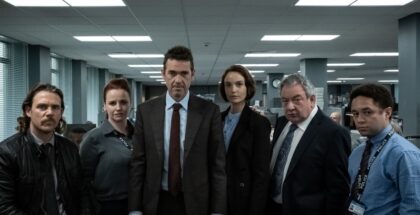True Crime Tuesdays: The Bombing of Pan Am 103
Review Overview
Geopolitics
3Compassion
7Innovation
5Helen Archer | On 17, Jun 2025
As is so often the case, when one dramatisation comes out on a subject, another is soon to follow. Lockerbie: A Search for Truth was released at the start of the year, a dramatisation of John Dower’s 2024 documentary Lockerbie, both of which were based on bereaved father Jim Swire’s account of his journey since losing his daughter Flora on the flight, which killed all 259 on board and 11 on the ground in the terrorist attack in 1988. His was a complex tale of international intrigue, geopolitics, and labyrinthine rabbit holes into what many refer to as ‘conspiracy theory’. This latest dramatisation is a very different beast.
Though beginning with very similar scenes of the devastation of the night of the crash – just before Christmas, when the plane exploded over the small Scottish town of Lockerbie – and though both lead to years-long grieving and trauma for those left behind, this six-part dramatisation, directed by Michael Keillor, then veers into territory that can best be described as BBC Sunday evening viewing, with all that entails. Taking a humanistic rather than analytical approach, it is more interested in investigating personal and workplace politics than the bigger picture.
The investigation rumbles on for the rest of the series – the complicated bid to recover evidence from a 850-square-mile crime scene, the reconstruction of the luggage carrier of the plane and of its explosion to figure out exactly where the bomb was placed; the eventual trips to Jordan and Malta, leading to the condensed trial of the final episode – but much of the story remains on the ground in Lockerbie, and on the way the community stepped up to embrace the loved ones of those who lost their lives on its soil. From the outset, residents acted with the humanity so lacking in the American officials’ response, wanting to do something useful in the face of so much pain and trauma – be it staying with the remains of those who fell from the ground until they could be collected, or, later, cleaning the clothes and belongings found among the debris so they could be returned to families, boxed up neatly with a thoughtful sprig of heather placed on top.
Despite this, within the drama, the victims’ families are peripheral characters, there merely to interact with those whose stories we more-or-less follow through the years, like local police officer Ed McCusker (Connor Swindells), Kathryn Turman(Merritt Wever) a Senator’s assistant with a special interest in victim assistance, and FBI agent Dick Marquise (Patrick J Adams), as they navigate their workplace politics. Other actors – Peter Mullan, Tony Curran, James Harkness, Kevin McKidd and Eddie Marsan – playing varying degrees of law enforcement – come and go, as the investigation proceeds through the years, though the toll taken on them is confined to those who were first responders on the night of the crash.
It results in a narrative flattened to its most obvious, linear telling, focusing mainly on the nature of victim representation in the late 20th century and the progress it has made since then. It is, perhaps, spoiled slightly by the existence of the earlier, more mentally demanding series, repeating as it does many of the facts, without any of the analysis. While it attempts to be both about investigation and about the human toll, it can never seem to decide quite where it falls, so that – despite the ensemble acting – the viewer never has a chance to get a full grip on any particular strand. Though relatively ambitious, it remains, in its essence, fairly old-fashioned Sunday night viewing.



















